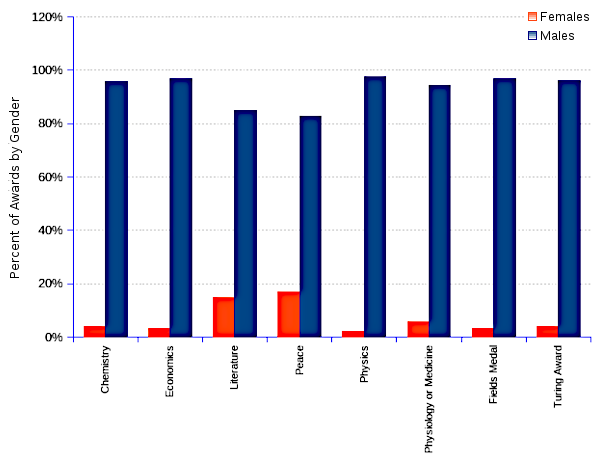areppim: information, pure and simple

Yes, if oxen and horses and lions had hands and could, with their hands, paint and produce works like men, the horses would paint figures of gods like horses, and the oxen like oxen
(Xenophanes of Colophon, born around 570 BC)
Accordingly, as long as predominantly male jurors decide upon the comparative merits of male and female scientists, one might expect them to be strongly biased in finding superior gifts in other fellow men.
If major awards were a reliable indicator of gender capability, which in all likelihood they are not, one should concede that intellectual performance, along with soccer playing, barbecuing or binge drinking, is a male's domain. Overall, males won a hefty 94% of all major awards, while women had to make do with a tiny 6% share. Women were distinguished only twice (out of 64 awards) with a Fields Medal for mathematics. Even in the more contemporary computer science, they won the Turing Award only three times, i.e. only 4% of the time.
However, the indicator is highly partisan. In several cases, for instance in the computer science field, it is widely conceded that female scientists made decisive contributions that have been typically credited to their bosses, the more conspicuous male contributors. Only lately some female contributions have been acknowledged and recognized. Also some Nobel prizes have triggered harsh controversy for reasons of outright ignoring indispensable breakthroughs by female contributors.
A revealing example is provided by the award, in 2018, of a Special Breakthrough Prize in Fundamental Physics, worth of £2.3 million, to Jocelyn Bell Burnell. Why is she deemed such a deserving scientist? Simply for having been the first to observe and precisely analyze the pulsars, back in 1967. The pulsar breakthrough was duly recognized by a Nobel prize in physics in 1974, awarded to Hewish, Jocelyn's thesis supervisor, and another astronomer, Ryle. Not to Bell — her achievement was disdained by the Nobel committee. How many other female scientists remain ignored after having seen their output diverted by the team leader for his own profit and glory?
The unbalanced split of the awards, rather than portraying the genuine talents of the genders, turns out to be a revealer of the workings of our society, namely of the process by which value judgments are produced in male dominated power structures. This should not come as a surprise, since, after all, male dominated assessment teams are liable to be more lenient towards their gender, as females would likely go easier on females, whites on whites, and so forth. Sociocentrism is widespread.
| Award | Female | Male | Total | ||
|---|---|---|---|---|---|
| Number | Percent | Number | Percent | ||
| Nobel Prize | 66 | 6.7% | 915 | 93.3% | 981 |
| Chemistry | 8 | 4.1% | 189 | 95.9% | 197 |
| Economics | 3 | 3.1% | 93 | 96.9% | 96 |
| Literature | 18 | 14.9% | 103 | 85.1% | 121 |
| Peace ¹ | 19 | 17.1% | 92 | 82.9% | 111 |
| Physics | 5 | 2.2% | 222 | 97.8% | 227 |
| Physiology or Medicine | 13 | 5.7% | 216 | 94.3% | 229 |
| Fields Medal ² | 2 | 3.1% | 62 | 96.9% | 64 |
| Turing Award ³ | 3 | 3.9% | 74 | 96.1% | 77 |
| Total awards | 71 | 6.3% | 1,051 | 93.7% | 1,122 |
| ¹ The 31 Nobel Prizes for peace awarded to organizations are not accounted for in this table. ² The Fields Medal is awarded every four years, the first time in 1936, the last time in 2022. ³ The Turing award is announced at the beginning of the following year. | |||||
Sources: Nobel Prize, International Mathematical Union Fields Medal, ACM Turing Award